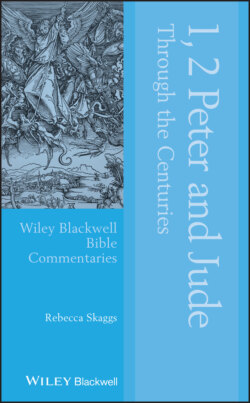Читать книгу 1, 2 Peter and Jude Through the Centuries - Rebecca Skaggs - Страница 54
Doctrinal Interpretations: The Priesthood of all Believers
ОглавлениеDuring the Reformation, a doctrine was developed from 1 Peter 1:9 (as well as from parallel passages in the Pauline epistles) by the Lutheran and Reformed Churches, and followed by the Protestant Free Churches, stressing that all humans have direct access to God through Christ, the true high priest, and thus do not need a priestly mediator. This democratic stance meant that all Christians are equal before God and hence the ordained clergy are merely representatives of the congregation, filling the role of preaching and administering the sacraments.
Many early writers interpreted the verse this way. Clement of Alexandria states, “We are priesthood because of the offering which is made in prayers and in the teachings by which souls which are offered to God are won” (Adumbrations). Origen also acknowledges that Christ’s redemption results in all Christians being priests: “Because you are a priestly race you are able to approach the sanctuary of God.” But he adds a warning, “do not let the fire depart from your altar” (Sermons on Leviticus 9.9; Sermons on Leviticus 4.6). Augustine adds his consensus: “In ancient times only one high priest was anointed, but now all Christians are anointed” (Sermons 198A). Similarly, Leo the Great (400–461) remarks, “All who have been born again in Christ are made kings by the sign of the cross and consecrated priests by the anointing of the Holy Spirit” (Sermons 4).
Later, Andreas, Severus of Antioch (c. 459), and Bede assert that the priesthood of all Christians is because Christ himself is priest and king. The same way that we are holy because he is holy, we are priests because he is a priest (Andreas, Catena; Severus, Catena; Bede, On 1 Peter).
Religious traditions also differ on their understanding on this issue. For example, The Second Helvetic Confession (1566) makes the point, “Christ’s apostles call all who believe in Christ ‘priests,’ but not on account of an office” (Pelikan II, IV: 500). In contrast, the Westminster Confession of Faith (1642) cites v.5 in regard to “spiritual sacrifices acceptable to God,” but does not stress the point about all Christians being able to fill the role of priest (ibid.: 632). See also the True Confession of the English Separatists (1596) (Pelikan III, V: 36).
From a social‐science perspective, Green (2007: 61) argues that:
Neither here [v.5] nor in v.9 can we find a basis for the Reformation doctrine of “the priesthood of all believers,” not because the doctrine lacks warrant (e.g., 4:10–11), but because Peter’s emphasis is not on the priestly role of each believer but on the priestly identity of God’s people.
